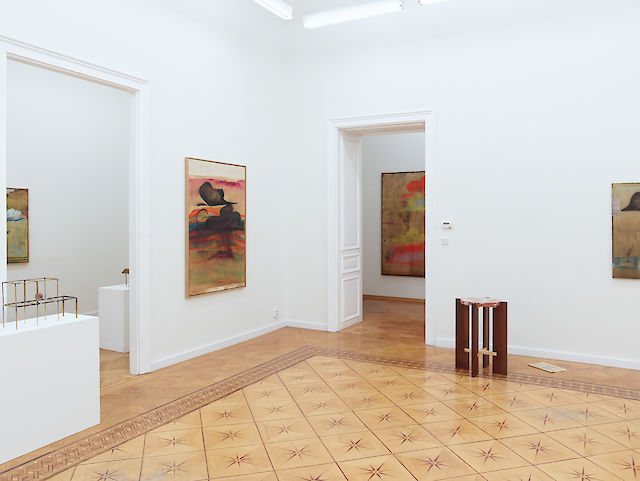Images

Benoît Maire, installation view Disaster, 2017 Photo: Pascal Petignat

Benoît Maire, installation view Disaster, 2017 Photo: Pascal Petignat

Benoît Maire, installation view Disaster, 2017 Photo: Pascal Petignat

Benoît Maire, a fake, Minneapolis Times Tribune, 12 October 1939, 2017, Pen on newspaper, frame, 64 × 47 × 3.5 cm Photo: Pascal Petignat

Benoît Maire, installation view Disaster, 2017 Photo: Pascal Petignat

Benoît Maire, Installation view Disaster, Croy Nielsen, Vienna, 2017 Photo: Pascal Petignat

Benoît Maire, installation view Disaster, 2017 Photo: Pascal Petignat

Benoît Maire, installation view Disaster, 2017 Photo: Pascal Petignat

Benoît Maire, installation view Disaster, 2017 Photo: Pascal Petignat

Benoît Maire, Castle, 2017, Brass, oyster, 22 × 14 × 30 / 72 × 45 × 45 cm Photo: Pascal Petignat

Benoît Maire, Castle, 2017, Brass, fossilised wood, 30 × 19 × 45 / 80 × 40 × 140 cm Photo: Pascal Petignat

Benoît Maire, Disappearing, 2017, Butterflies, stencils, cardboard, film, 19 × 15 × 3 cm Photo: Pascal Petignat

Benoît Maire, installation view Disaster, 2017 Photo: Pascal Petignat

Benoît Maire, installation view Disaster, 2017 Photo: Pascal Petignat

Benoît Maire, installation view Disaster, 2017 Photo: Pascal Petignat

Benoît Maire, Disappearing, 2017, Plastic toy, wood, 41 × 19 × 19 / 96 × 33 × 33 Photo: Pascal Petignat

Benoît Maire, la menace, Paris-soir, 21 Octobre, 2017, Pen on newspaper, frame, 64 × 47 × 3.5 cm Photo: Pascal Petignat

Benoît Maire, Waste indexed ‘forgotten’, 2017, Butterfly, plexi glass, letraset letters, 9 × 3 × 9 cm Photo: Pascal Petignat

Benoît Maire, Cloud Painting, 2016, Oil on canvas, 150 × 100 cm Photo: Pascal Petignat

Benoît Maire, Cloud Painting, 2017, Oil on canvas, 200 × 150 cm Photo: Pascal Petignat

Benoît Maire, Cloud Painting, 2017, Oil on canvas, 195 × 150 cm Photo: Pascal Petignat

Benoît Maire, Cloud Painting, 2017, Oil on canvas, 100 × 75 cm Photo: Pascal Petignat

Benoît Maire, Cloud Painting, 2017, Oil on canvas, 100 × 75 cm Photo: Pascal Petignat

Benoît Maire, Cloud Painting, 2017, Oil on canvas, 100 × 75 cm Photo: Pascal Petignat

Benoît Maire, Cloud Painting, 2017, Oil on canvas, 150 × 120 cm Photo: Pascal Petignat
Press Release
Benoît Maire’s third solo show at Croy Nielsen brings together several bodies of new work, including paintings, sculptures, a video and historical newspapers. Maire’s practice evolves in the field of tension between art and philosophy, drawing from psychoanalysis, literature and mythology.
The word disaster is derived from Middle French désastre and Old Italian disastro, which in turn comes from the Ancient Greek pejorative prefix dus- (“bad”) and aster (“star”). Thus, the root of the word arises from an astrological reading of a calamity blamed on an unfavourable position of the stars and planets. The stars are one of humanity’s oldest means of orientation and guidance, and glancing at the entwined history of philosophy and science it seems as if we always had to look first at the scintillating firmament above us to consequently understand our most immediate surroundings.
Clouds as well, have a history of being used for at least short-term predictions of weather in meteorology as well as psychic fortune telling in aeromancy, for those more prone to the supernatural. Historically, the increasing relevance of clouds in sciences is paralleled by the artistic discovery of clouds as a motif able to embody the ephemeral just as much as the eternal. The clouds in Maire’s paintings present themselves in a multiplicity of shapes, colours, and backgrounds and also their forms of inception are of varying nature. Some are created with brushes while others are the result of spray paint or stencils boasting a wide range of flat and precise contours, voluminous pastose shapes to watery and transparent variations, and creating moods and atmospheres as manifold as their real models.
Still today we inscribe our wishes, hopes, and fears into the ephemerality of the clouds, and the cloud has even been stylised into a symbol for the accumulation of data, currently holding the reins of our fate, as our movements, habits, and intentions are tracked and predicted. At the same time the useful ability of weather forecasting by means of observation seems to have been lost, now that we are seeking comfort in the happy little sun on our iphones coinciding with pouring rain outside our windows. But we can find remnants of this practical knowledge in popular wisdom and proverbs, formed over decades and centuries of experience by those most dependant on the whims of the weather such as farmers, sailors or soldiers.
Red sky at night
Sailor’s delight
Red sky in the morning
Sailor’s take warning
Yet another red warning is spoken by the terms highlighted by Maire on newspaper front-pages, dating back to the years between 1938 and 1945, documenting one of humanities gravest disasters in recent history, namely WWII. Much like an astrological map of prediction or premonition the circled words hint to concepts which are still of relevance today or which might have changed the course of fate leading to our contemporary new normal of Post-truth, Fake News and Anything-Goes-Politics. We are left to wonder if any of this could have been avoided had we been able to decipher the encrypted, enigmatic alert.
Hardly a coincidental choice, since WWII was the first war, which was largely defined by air-warfare. Especially the approach taken by the allied forces emphasized strategic bombing and tactical control of the battlefield by air as well as adequate aerial defence. Once again the fate of humanity was defined by the skies but this time it was bombs, erasing landscapes from the map, jet fighter squadrons attacking in skilful manoeuvres and even pigeons serving as clandestine means of communication while Falcons were trained to capture them.
Laura Amann